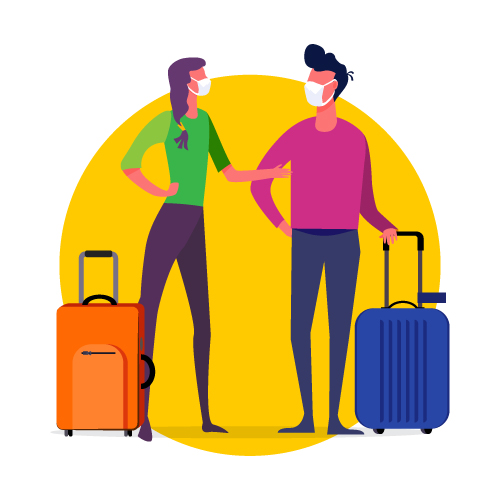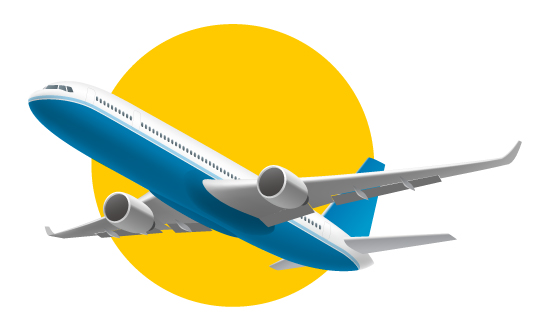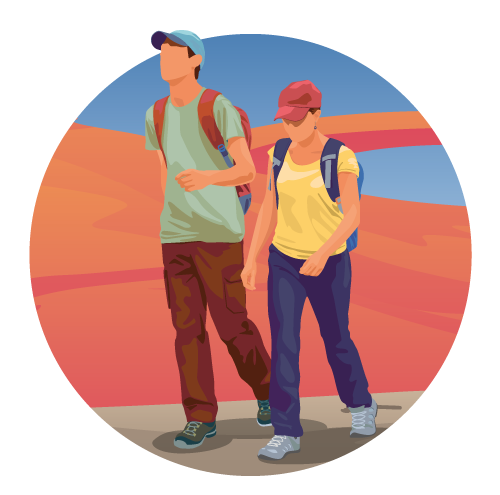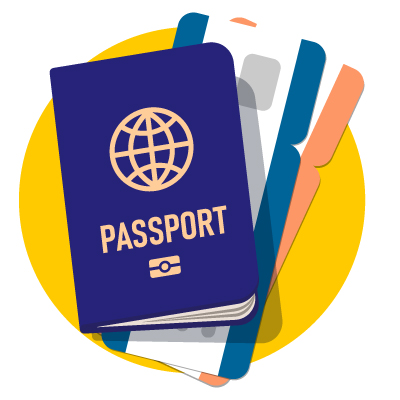Travel Guidance
Updated 3/28/2022
COVID-19 testing for travelers
After March 31, 2022, the state of Utah will no longer provide free travel testing. People seeking COVID-19 travel testing will need to find a testing provider which offers the type of test required by their travel destination. You can find testing providers by searching under "test type" here; contacting your travel agent, airline, or travel destination; or doing an online search.
Costs for travel testing are estimated between $60-$350 depending on the type of test needed and the company offering the test. Insurance may not be accepted for travel testing. Some private travel testing options may include: XpresSpa, Walgreens, CVS ($139), Nomi Health ($59-$179), iHealth ($43), Premier Diagnostics ($50-$125), Quest Diagnostics ($70), COVID Clinic ($75-$320), SoftCell Laboratories ($100), Gunnison Valley Hospital ($164), and more.
Travelers are responsible for making sure their test will be accepted.
Travelers are responsible for following any travel requirements of their destination. Some travel destinations may also require testing to be done at specific testing locations or include QR codes linked to results and CLIA information. You are also responsible for making sure your travel destination will accept the type of COVID-19 test you get. Travel destinations which require proof of a negative COVID-19 test upon arrival may offer testing to travelers or the option for a mandatory quarantine for those who do not wish to be or who are unable to be tested upon arrival. For information on travel requirements by destinations, visit the CDC travel webpage.
If you need a letter stating you’ve recently tested positive for COVID-19 and have completed your isolation, email the Utah Department of Health at contact.tracing@utah.gov. We can only provide letters if you were tested by a clinical lab, provider’s office, or official testing site that reports results to the Utah Department of Health. We do not provide letters for at-home test results.

Travel during COVID-19
Travel increases your risk of being exposed to the virus that causes COVID-19. The CDC recommends you are up-to-date with your COVID-19 vaccinations before traveling. Learn what to do after you return from international travel here.

Travel Restrictions in Utah
There are no travel or quarantine restrictions in the state of Utah.
- Visitors to Utah or those returning home to Utah after traveling are not required to quarantine upon arrival.
- You may be required to provide proof of vaccination or a negative COVID-19 test result before traveling on airlines or to some destinations.
- There may be restrictions entering the U.S. if you travel to areas with widespread COVID-19 infection. Know the restrictions in the area you are planning to travel to.
- Consider purchasing travel insurance in case your travel plans need to be canceled due to sickness.
Utah does not have a statewide mask mandate.
- Some businesses may still have mask requirements to protect employees and customers who haven’t had a chance to get vaccinated yet. Please respect any mask requirements posted by businesses, and wear a mask.
- National parks and monuments may have indoor mask requirements.
Visit https://www.visitutah.com/plan-your-trip/covid-19 for more information on traveling to Utah during the pandemic.

Traveling if you’re not up-to-date with your COVID-19 vaccinations
The CDC recommends you are up-to-date with your COVID-19 vaccinations before traveling. If you do travel, take precautions to protect yourself and others: wear a mask, physical distance, wash your hands often, and try to avoid touching things other people touch. Bring hand sanitizer and disposable wipes with you in case you do not have soap and water to wash your hands.
- When you travel, you may want to use a disposable tissue or napkin to touch things like handrails, door handles, elevator buttons, etc.
- Try to use vendors and accommodations (hotels, restaurants, etc.) that take steps to prevent the spread of COVID-19 in their business.
- If you get sick when you are traveling and need medical advice, you should call a doctor right away. If you get sick when you are outside of the United States, call a doctor or overseas medical assistance company to help you find the right healthcare provider in that country. A U.S. consular officer can help find healthcare services. However, U.S. embassies, consulates, and military facilities do not have the legal authority, capability, or resources to evacuate people from the country, or give medicines, vaccines, or medical care to private U.S. citizens overseas.

International Travel During the Pandemic
Proof of vaccination to enter the United States:
Starting on November 8, 2021, non-U.S. citizens who are not immigrants to the United States will be required to be fully vaccinated and provide proof of their vaccination status to fly to the United States. Vaccines accepted will include FDA approved or authorized and WHO Emergency Use Listing vaccines. Learn more here.
Proof of negative COVID-19 test results to enter the United States:
Air passengers, 2 years or older, traveling to the United States from another country must present a negative COVID-19 test result or documentation of recovery from COVID-19 before boarding their flights. Regardless of vaccination status, passengers ages 2 or older are required to present a negative COVID-19 viral test result from a sample taken no more than 1 day before travel. Alternatively, passengers may present documentation showing that they tested positive for COVID-19 on a sample taken within the past 90 days and have been cleared to travel (documentation of recovery). Learn more
All air passengers to the United States will also be required to provide basic contact information to airlines before boarding flights to the United States. This will allow airlines to better coordinate with public health agencies to share information when needed to keep the public safe and informed, and strengthen their ability to rapidly identify and contact people in the U.S. who may have been exposed to a communicable disease, such as COVID-19.
Learn more about these requirements here.
The CDC also provides a list of travel recommendations based on how much COVID-19 is spreading in a country. There may be some restrictions on who can enter the United States at this time. United States at this time.
After returning from international travel:
It is important to take precautions after you return from another country, where many people may not yet be vaccinated and where there may be very high rates of COVID-19 or variants of the virus.
- Get tested 3-5 days after returning from your trip. You can find a list of testing locations here or by calling a healthcare provider.
- Watch for symptoms of COVID-19 for 14 days after you return from your trip. You can find a list of common symptoms of COVID-19 here.
- Isolate and get tested right away if you have symptoms of COVID-19.
Travel Within the United States During the Pandemic
The CDC has a tool to help travelers get information about COVID-19 restrictions. This tool lets you enter a city, zip code, address, or national park name to learn more about travel restrictions and resources in your destination.
More information on travel can be found on our Frequently Asked Questions page: https://coronavirus.utah.gov/faq/
